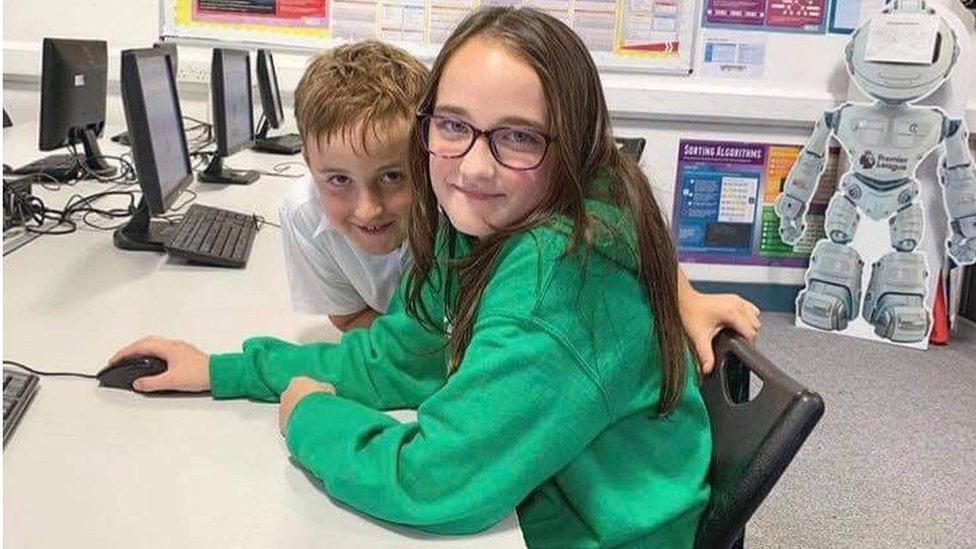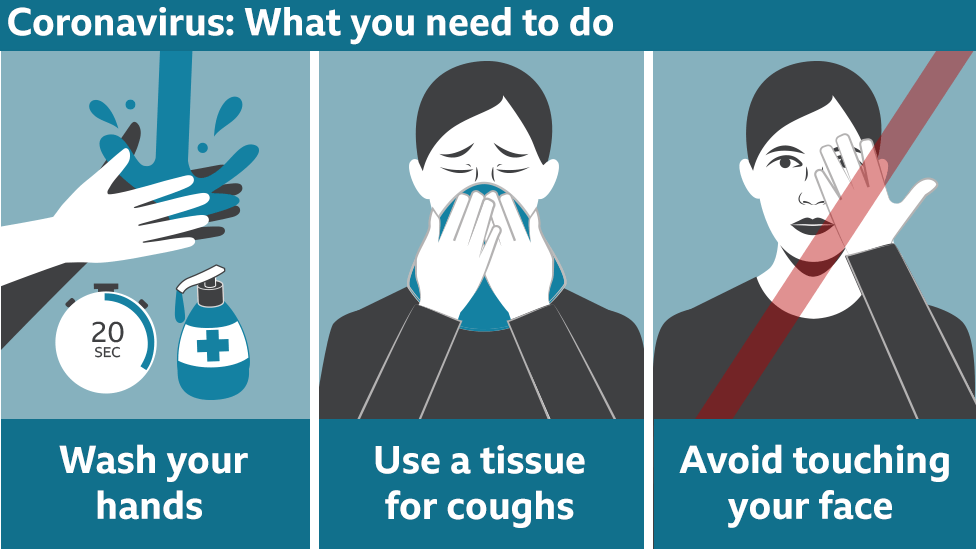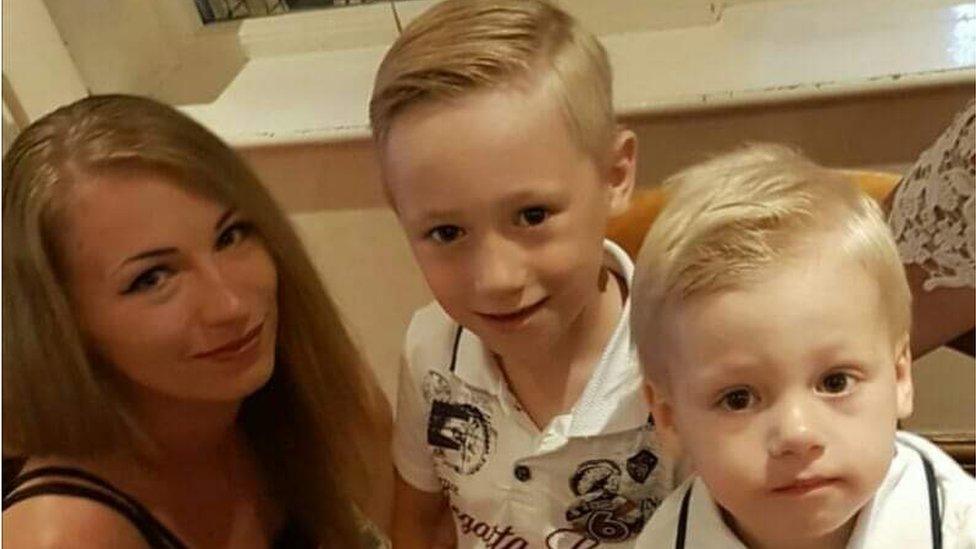Pupils 'scared and anxious' about school closures
- Published

Laila and Jack are having to adjust to life without school
"They're quite scared at the moment, if I'm honest," says Lucy of her children, Laila, 11, and Jack, 10.
"They're worried they're going to catch it, they're wondering when they'll see their friends again."
Jack is already at home - the closure of his special-needs school was announced on Wednesday evening.
He has autism and attention deficit hyperactivity disorder (ADHD) and his behaviour "can be very challenging when he hasn't got a routine", says Lucy, from Harefield, in outer London.
And she is worried about him and his school friends.
"It will be a nightmare to get them back to school if they've had a long time off," she says.
Laila, who will also be home for the foreseeable future when her school closes, on Friday, is disappointed not to be sitting her Year 6 national curriculum tests, often known as Sats.
"She's worked hard to get herself up from being an underachiever to being on target," Lucy says.
"It all feels like such a waste."
And Lucy is also worried about her own job security, having just started work as a receptionist in a special-needs high school.
Key workers
Alice, a nurse in a doctors' surgery, is hoping her job will allow her 11-year-old son one of the few school places allocated to the children of key workers.
"Although my boy would much prefer to stay off school, I would like him to continue," she says.
But Tanya, a GP married to a hospital doctor, is worried about the risk of contagion to her two children if they remain at school.
"My children are already exposed to my husband and myself and now they will be exposed at school to other children and teachers, she says.
"I didn't sign up to do a job to put my children at risk.
"There's just been an assumption that we will just do this.
"More testing of front-line staff would help.
"At least then there could be more staff, because at the moment they have to self-isolate without knowing whether they have it or not."

A-level student Caitlin Smith is hoping for a place at Durham University
A-level student Caitlin Smith, 18, from Leeds, says the uncertainty is "driving me absolutely nuts".
"Our lives revolve around education," she tells BBC News.
"I get up I go to sixth-form and then I stay at the library.
"By the time I finish, I've done a 12 hour day
"We've been working for these exams for so long and been told to be revising since December.
"Now, I don't really know what to do with myself.
"I guess I can catch up on Netflix series I've been meaning to watch."

A SIMPLE GUIDE: What are the symptoms?
AVOIDING CONTACT: Should I self-isolate?
LOOK-UP TOOL: Check cases in your area
MAPS AND CHARTS: Visual guide to the outbreak
VIDEO: The 20-second hand wash

Her predicted grades could help win her a place at the University of Durham, Caitlin says, but she fears missing out on apprenticeship schemes with law firms in the city.
"I applied for them, thinking I'd be able to get the right grades and show my full potential in the exams," she says.
"I know I've worked hard over the last two years.
"But for other people who have maybe gone through that time thinking that it'd be the exams that really count - for some, it won't be an accurate representation of their abilities.
"Some people need that adrenaline that comes to you in the exams.
"I think my results from my mock exams would have gone up a grade or so."
Caitlin is "trying not to be so critical" of the government, however, "because I couldn't do a better job".
She adds: "Obviously if we move these exams back a year, that's going to push everything back for the next year.
"So, realistically, we need to get our year group through."
Vulnerable teens
Mary, a mother of teenagers in Scarborough, says her younger daughter is very sporty and will feel the loss of her clubs and competitions acutely.
She is also concerned that some of her children's more vulnerable classmates who come from difficult backgrounds will be hit particularly badly once schools and youth clubs close their doors.
"School offers children with difficult lives some sort of stability.
"This loss of infrastructure will have an immediate impact.
"How are we going to keep them onside without it?"

For workers not regarded as key, trying to hold down a job while looking after young children is another concern - and there are financial worries, too.
In Essex, Marta, an accountant, says she pays £400 for after-school clubs for her children, aged four and seven, and she doesn't want to stop the direct debt for fear of losing their places.
"Now that my kids will be at home full-time I'm expecting my grocery bill to rise.
"I will have to keep them occupied and entertained while at the same time working."

Marta with Michael (7) and James (4)
Meanwhile in north London, Victoria says her daughter's school has already shut down all classes apart from the exam years because of staff shortages.
And being at school had become "increasingly odd" for both her children.
"Initially they were quite excited at getting time off school," she says.
But now the announcement has come, "they're quite anxious, not joyous", because there is so much uncertainty about how long the closures will be and when they will see their friends again.
"I'm trying to keep them calm - telling them they're fit and probably won't get it and it will pass," Victoria says.
"But they're concerned about friends with underlying health issues and have lots of questions."
Some names have been changed.